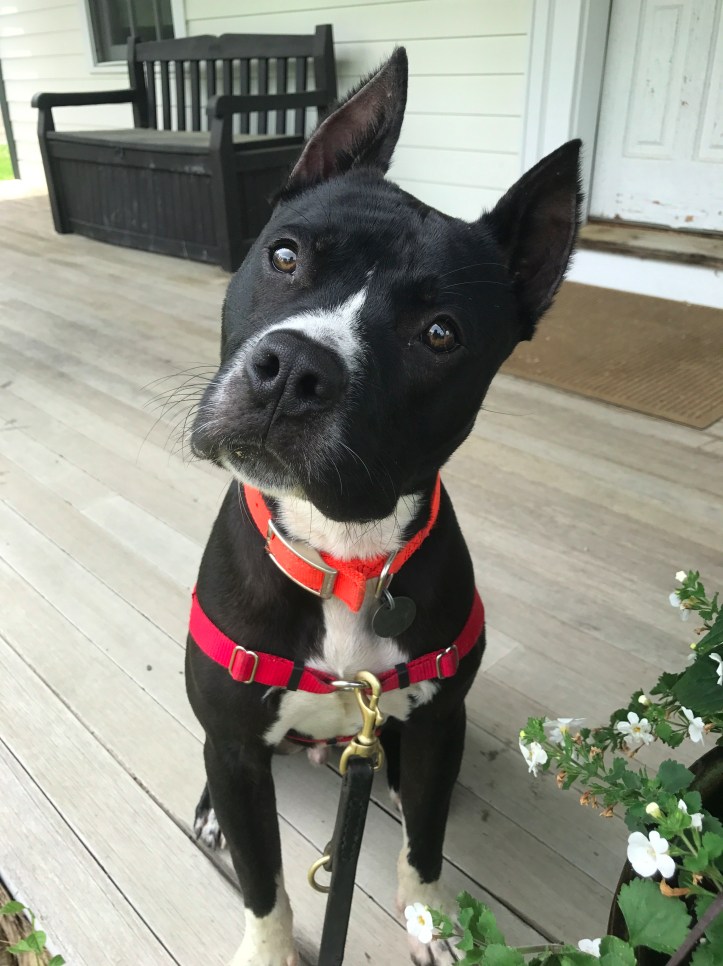Just like humans, dogs have five basic senses. Ignoring their sensory needs may lead to stress and undesirable behaviors.
 Source: Animal Farm Foundation
Source: Animal Farm FoundationLet’s Break This Down:
- Who doesn’t love pizza? It’s awesome. But if you ate it every day, it would get really gross.
- Staring at a computer all day starts to suck after a few hours. You don’t just want to look at something different, your body needs you to look at something different.
- A 5-hour plane ride with a screaming baby is never fun and the radio gets really tiring when they play the same song over and over again.
- Sniffing cleaner all day is really not a good idea and if you think about, sniffing the same flower all day is going to get overwhelming.
- Does a massage sound like heaven right about now?
Now that you get the idea, let’s stop anthropomorphizing and get real world methods for dog enrichment:
Sound
Sound is a dog’s most highly developed sense. A dog can get agitated and nervous just from hearing other dogs bark.
 100vw, 723px” data-recalc-dims=”1″ /><figcaption id=) Source: Animal Farm Foundation
Source: Animal Farm FoundationKeep shelter dogs quiet with Click for Quiet games in which you reward quiet dogs with positive “YES!” (or clicker sound) and a treat. Don’t give barking dogs any attention. This is a great project for volunteers.
Soft or soothing music also helps keep dogs quiet. Try classical music, audio books, or music created specifically for dogs.
Smell
is how dogs greet the world. Shelters not only smell like other animals, but are often full of chemical odors.
Create fun things for dogs to do with their noses. Make “find it” puzzles by hiding treats in blankets, towels, or rags. Hide treats in a fenced yard for some fun outdoor time. Don’t forget to cheer them on as they sniff out the rewards.
 Source: Amalia Diaz for Austin Animal Center
Source: Amalia Diaz for Austin Animal CenterUse interactive toys or make your own. Drill a few holes in PVC pipe elbows (big enough for treats to fit through) and then let your dog play with the toy to get the treats to fall out.
Another great trick is to fill a spray bottle with water and 10-20 drops of an essential oil, such as lavender, vanilla, or almond. Spray a fine mist on their beds, blankets, or kennel walls. Rotate the scents to keep the dogs engaged.
Sight
Sight can be tricky because no matter how long the dog is in your shelter, the environment never becomes natural. Some dogs get stressed by dogs or humans simply passing by their kennels.
” width=”723″ height=”964″ data-recalc-dims=”1″ /><figcaption id=) Source: Animal Farm Foundation
Source: Animal Farm FoundationFor reactive dogs, place barriers at the front or sides of their kennel. This can be anything like poster board, sheets, shower curtains, etc… Have people toss treats as they pass by the dog. This will help him associate traffic flow with positive things.
It is important to give dogs an occasional change of scenery. Let them take a stroll around the parking lot, spend an afternoon at the front desk or in someone’s office, or let them go on a play date. Changing up which kennel they spend time in works well for some dogs, too.
Taste
is closely linked with smell. This may cause some dogs to ignore food due to the unfamiliar smells in a shelter environment. Poor health might also affect a dog’s sense of smell, causing them to ignore meals.

Try adding broths, like chicken or beef, to food or serve alone. Soak rags or tug toys in broth. Freeze and give as a special treat. (These are especially good for teething puppies!)
For dogs who inhale their food, try feeding from Kongs, milk jugs, bottles, PVC pipes, and other feeding puzzles. These add an element of stimulation and help slow down the eating process.
Touch
Touch is important because shelter dogs often don’t get enough human contact. We rush to exercise and feed them but forget to sit and touch them. Patting and massaging dogs, especially in a quiet space, promotes a better mental and emotional state.
 Source: Animal Farm Foundation
Source: Animal Farm FoundationEnlist volunteers to work as “quiet time” companions for your dogs. Have them sit in the dog’s kennel for 10+ minutes to pet and massage them. They can bring a book and read to them! Not only does the massage feel good, it also teaches dogs how to stay calm when there are people around.
We know enrichment can be intimidating to some shelter workers, but once you take the leap, you’ll realize that it’s simple. Plus, it results in lots of smiling dogs, and there’s nothing better than that.

